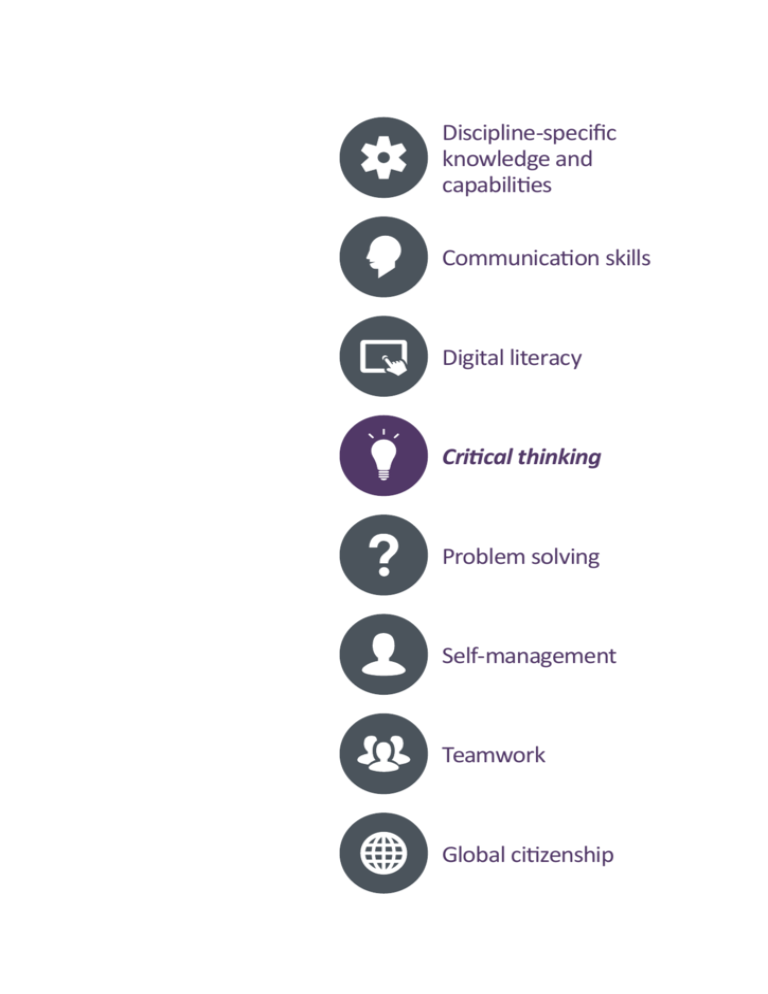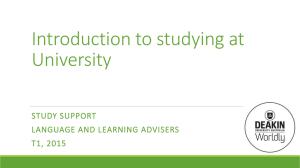- ALL COURSES
- Building the Adaptive Business Unit
- Leading in an Adaptive Organisation
- Effective Team Collaboration
- Developing and Encouraging Effective Teams
- Effective Communication in the Workplace
- Driving Compelling Communications
- Leading Effective Communication Streams
- Modelling Strategic Communication Streams

From Logic to Critical Thinking
- Imagination, Creativity and Insight
- Researching New Ways of Thinking
Understanding Customer-Centric Design
- Developing Customer Experience Interactions
- Managing Customer Experience Data Insights
- Setting Customer Experience Strategy
Developing Data-Driven Marketing Campaigns
- Building Marketing Insights
- Modelling Data for Marketing Campaigns
- Strategy Development in Data-Driven Marketing
Participating in the Digital Age
- Leadership in Digital Technology
- Strategic Digital Leadership
- Building Strategic Teams
- Leading Strategic Outcomes
- Fostering Innovation in Your Team
- Identifying Innovation Practices
- Implementing Workplace Innovation
- Leading Teams and Encouraging Productive Employee Behaviours
- Strategic Leadership and Establishing an Empowering Work Environment
- Solving Problems in the Workplace
- Problem-Solving Methodologies
- Strategic Problem-Solving in a Complex World

Start your journey or transform your career
Short courses with huge impact.
The success of your business depends on your (and your team’s) ability to evaluate information, make decisions and create solutions using critical and analytical thinking. This course aims to help you critically evaluate the information you use in your workplace and apply critical thinking principles to translate concepts or creative ideas into solutions for business problems. You will explore methodologies to investigate issues, how to apply logical thinking and draw conclusions, as well has how to challenge assumptions.
By the end of your course, you will be able to confidently define the critical elements and procedures to undertake a routine inquiry or investigation and to work collaboratively with colleagues to define problems, and investigate their cause. You will be able to implement known models, logical processes and common sense to improve insights and results when tackling business problems.
Modules in the From Logic to Critical Thinking online course include; Investigate methodology, logical evaluation and critical analysis.
Topics explored in this module:
- – Interview technique
- – Observation
- – Reasoning
- – Questionnaire surveys
- – Logical thinking
- – Investigation and evaluations
- – Logical reasoning
- – Drawing conclusions
- – Methodology selection
- – Thinking critically
- – Challenging assumptions
- – Conceptualisation
- Level: Proficient
- Ideal for supervisors and team leaders
- Delivered 100% online
- Complete in 4-6 hours
- Self-paced learning
- Interactive activities and case studies
- Gain in demand skills
- DeakinCo. Certificate
Price: $250
Why choose deakinco..
Complete in 4 - 6 hours
Focus on one, or build out a compelling portfolio, our bite-sized courses help you define your career.
100% Online
Our flexible self-paced online delivery allows you to study anywhere, anytime and around your other commitments.
DeakinCo. certificate
Showcase your learning with a certificate of completion or validate your skills with an optional Professional Practice Credential.
Be in demand
Globally respected and industry demanded, show employers you have the skills they want.
Discover new possibilities with DeakinCo.
In demand and on demand.
Learn the most sought after skills of today at a time and pace that suits you. Our online short courses are ready when you are.
You may also like these DeakinCo. online courses:

Aligned to Team/Unit Leader level
Course price: $250

Aligned to Team/Unit leader level

Learn something new today
- Deakin Library
Critical thinking in health research and media
Critical thinking in health research and media: about.
- In the media
- In research
- Let's reflect
About this module
This module will explore scenarios to demonstrate why we need to apply critical thinking to health research and media that we engage with. The first scenario will look at how health research studies are portrayed in the media, while the second shows how sometimes the world of health research itself can be murky.

What is critical thinking?
Critical thinking is one of Deakin's Global Learning Outcomes (GLO4). All students are required to develop skills in critical thinking, in order to make an informed evaluation of information and develop skills as an independent learner.
When reading articles in the media or even reading studies in the field of health research, critical thinking helps us question what we are reading and ensure that we understand the full context of the work. This helps us understand how much trust we should place in what we read.
For example, when a news article focuses on a health study, it can be useful to question:
- Are they accepting the study's conclusions without question
- Or critiquing the study's findings
Steps of Critical Thinking
Sometimes it can be helpful to break down critical thinking into different steps or actions you can take when reading an article. There are many ways to do this. Below is an example of a process or flow diagram you can follow when critiquing what you're reading.
Think of questions you might ask yourself at each step. Your questions may change depending on the resource you are appraising, e.g. not all questions will apply to the media you're looking at.
Source: Thyer, E. (2013). Development of the critical thinking teaching resource . Deakin University. https://www.deakin.edu.au/__data/assets/pdf_file/0012/51222/critical-thinking.pdf
Module learning objectives:
- Thinking critically about how health research is presented in the media
- Understanding a media story's intent and how that affects the reader
- Assessing how accurately research studies are portrayed in the media
- Understand the impacts that inaccurate communication of research can have
- Consider the methods used to correct inaccuracies
- Next: In the media >>
- Last Updated: Oct 22, 2024 4:16 PM
- URL: https://deakin.libguides.com/critical-thinking-health
- Social Science
- Political Science
Critical thinking - Deakin University

Related documents

Add this document to collection(s)
You can add this document to your study collection(s)
Add this document to saved
You can add this document to your saved list
Suggest us how to improve StudyLib
(For complaints, use another form )
Input it if you want to receive answer
- Soft skills
- What is a credential?
- Why do a credential?
- How do credentials work?
- Selecting your level
- How will I be assessed?
- Benefits for professionals
- Benefits for organisations
- Benefits for postgraduates
4 examples of critical thinking that show its importance

Posted on May 17, 2019
Critical thinking is the ability to make informed decisions by evaluating several different sources of information objectively. As such, critical thinkers possess many other essential skills, including analysis, creativity, problem-solving and empathy.
Employers have always found critical thinking extremely valuable – after all, no boss wants to constantly handhold their employees because they are unable to make their own judgements about how best to proceed.
However, all too often people talk about critical thinking in theory, while never really explaining what that knowledge looks like in practice. As a result, many have never really understood the importance of thinking critically in business. Which is why we’ve created this list of examples of how critical thinking skills are used in the workplace.
Critical thinking example 1: Problem-solving
Imagine you’re at work. Someone, potentially your manager, presents you with a problem. You immediately go off and start looking for solutions. But do you take a step back first to analyse the situation, gathering and reviewing as much information as possible? Do you ask each of the different people involved what their opinion is, or how the problem affects their and the broader business’ day-to-day? And do you decide to run with the first solution you find, or take the time to come up with a number of different options and test each before making your final judgement?
While a lot of people may think they have problem-solving skills, if you aren’t taking the time to follow the above steps, you’re not really being a critical thinker. As such, you may not find the best solution to your problem.
Employing critical thinking skills when solving a problem is absolutely essential – what you decide could impact hundreds of people and even have an effect on the financial health of the business. If you’re not looking at it from multiple perspectives, you’re never going to be able to understand the full impact of a decision.

Critical thinking example 2: Risk assessment
Economic uncertainty, climate change, political upheaval … risks abound in the modern workforce, and it’s an employee’s critical thinking skills that will enable a business to assess these hazards and act on them.
Risk assessment occurs in a number of different scenarios. For example, a construction company has to identify all potential hazards on a building site to ensure its employees are working as safely as possible. Without this analysis, there could be injuries or even deaths, causing severe distress to the workforce and negatively impacting the company’s reputation (not to mention any of the legal consequences).
In the finance industry, organisations have to assess the potential impacts of new legislation on the way they work, as well as how the new law will affect their clients. This requires critical thinking skills such as analysis, creativity (imagining different scenarios arising from the legislation) and problem-solving (finding a way to work with the new legislation). If the financial institution in this example doesn’t utilise these critical thinking skills, it could end up losing profit or even suffering legal consequences from non-compliance.

Critical thinking example 3: Data analysis
In the digital age critical thinking has become even more, well, critical. While machines have the ability to collate huge amounts of information and reproduce it in a readable format, the ability to analyse and act on this data is still a skill only humans possess.
Take an accountant. Many of their more mundane tasks have passed to technology. Accounting platforms have the ability to produce profit and loss statements, prepare accounts, issue invoices and create balance sheets. But that doesn’t mean accountants are out of a job. Instead, they can now focus their efforts on adding real value to their clients by interpreting the data this technology has collated and using it to give recommendations on how to improve. On a wider scale, they can look at historic financial trends and use this data to forecast potential risks or stumbling blocks moving forward.
The core skill in all of these activities is critical thinking – being able to analyse a large amount of information and draw conclusions in order to make better decisions for the future. Without these critical thinkers, an organisation may easily fall behind its competitors, who are able to respond to risks more easily and provide more value to clients.

Critical thinking example 4: Talent hiring
One of the most important aspects of the critical thinking process is being able to look at a situation objectively. This also happens to be crucial when making a new hire. Not only do you have to analyse a large number of CVs and cover letters in order to select the best candidates from a pool, you also need to be able to do this objectively. This means not giving preferential treatment to someone because of their age, gender, origin or any other factor. Given that bias is often unconscious, if you can demonstrate that you are able to make decisions like this with as little subjectivity as possible, you can show that you possess objectivity – a key critical thinking skill.
Hiring the right talent is essential for a company’s survival. You don’t want to lose out on top candidates because of someone’s unconscious bias, showing just how essential this type of knowledge is in business.
Prove your critical thinking skills with professional practice credentials
As you can see, critical thinking skills are incredibly important to organisations across all industries. In today’s constantly changing world, businesses need people who can adapt and apply their thinking to new situations. No matter where you’re at in your career, you need critical thinking skills to complete your everyday tasks effectively, and when it comes to getting your next promotion, they’re vital.
But the problem with critical thinking skills, just like all soft skills, is that they are hard to prove. While you can show your employer you have a certificate in computer programming, you can’t say the same of critical thinking.
Until now. Enter Deakin’s professional practice credentials. These are university-level micro-credentials that provide an authoritative assessment of your proficiencies in a range of areas. This includes critical thinking, as well as a number of other soft skills, such as communication, innovation, teamwork and self-management.
Find out more about our credentials here or contact a member of the team today to find out how you can prove your critical thinking skills and take your career to the next level.

COMMENTS
One way to develop better critical thinking skills is to keep a personal reflective journal of ideas and observations you have taken from readings. You can use your responses developed in the journal to help you plan research, take further notes, and contribute to class discussions.
In business, it empowers employees to learn from their mistakes, recognise opportunities, identify the causes of problems, and research and anticipate likely futures. By doing these things, critical thinkers can overcome challenges and improve business outcomes.
Critical thinking is an essential skill at university. It includes making judgements, forming your own opinions and developing your own arguments in response to classes and seminars, and during the reading and writing process.
This unit provides an introduction to the principles of critical thinking which underlie such skills. Students will learn how to identify the structure of an argument in a 'logical outline', detect common reasoning errors and fallacies, and construct sound arguments of their own.
Critical thinking can help you evaluate information objectively in order to solve problems and make the right decisions at work. By following these tips, thinking critically will become second nature to you and, in turn, it’ll benefit your team in the workplace.
This guide provides strategies, tools and ways of thinking to build your critical reflection skills. Through engaging with the content and activities you will learn how to: Recognise the main features of critical reflection
Learn the digital literacy skills critical for social life, working life and lifelong learning in an increasingly digitalised and connected world. Use data to gain original insights and strategically build, test, review and enhance marketing campaign performance with confidence.
What is critical thinking? Critical thinking is one of Deakin's Global Learning Outcomes (GLO4). All students are required to develop skills in critical thinking, in order to make an informed evaluation of information and develop skills as an independent learner.
Critical thinking is a vital skill for graduates entering a dynamic workforce. Critical thinking will also aid them with developing self-management skills and prepare them well for lifelong learning.
Critical thinking is the ability to make informed decisions by evaluating several different sources of information objectively. As such, critical thinkers possess many other essential skills, including analysis, creativity, problem-solving and empathy.